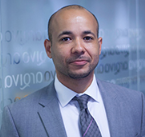
Critical and helpful information is made available at WTA's site where they interviewed ...
Denis Onuoha is the Chief Information Security Officer at Arqiva, a major UK infrastructure company which supports 40 percent of the UK's Critical National Infrastructure spanning the broadcast, telecommunications, finance, energy and utility sectors. He has the overall responsibility for Security Risk Management, Information Assurance and Cyber Security for the company and is at the forefront of its fight in defending against the latest media industry cyber-attacks.

Denis holds a BSc in Computer and Network Security from the University of Hertfordshire and is close to completing the MSc in Information Security at Royal Holloway. Having completed his undergraduate studies, he commenced work in the financial sector with responsibilities for Risk and Information Security, subsequently making the move across to the broadcast industry.
A proactive IT professional, Denis sits on three of UK's Centre for the Protection of National Infrastructure (CPNI) Government Information Security Exchanges, is the elected Chair of the AIB Cyber Security Working Group and is a member of the CREST industry advisory panel.
In their interview with Denis, they asked him:
- As service providers, teleports have a special vulnerability. A successful attack on them can compromise not just their business but that of customers trusting the teleport operator with their assets. Does that warrant an extra level of vigilance and layer of technology?
- There is a new EU directive that creates significant liability for companies whose availability is impacted by a cyber attack where it can be shown that they did not take the proper precautions. Could you tell us about that and the impact it has on your work?
- Is cyber security becoming a competitive advantage?
- Cyber security was once about passive defense – antivirus and firewalls – but that is rapidly becoming ancient history. Why? What is required for a robust cyber-defense today?
- What does it take, in terms of management and governance, to make cyber security a true priority for a company? What are the roles of the CEO, COO, CFO and CSO in this?
- This past year was when ransomware leaped into the headlines. What is your specific advice on dealing with it before and after an attack?
- Cyber security is almost constantly in the headlines today, yet the story is always the same. The company being hacked was running antiquated security technology, failed to patch operating systems and generally never took things seriously. Why is this still happening?
- What steps should smaller operators be taking?

